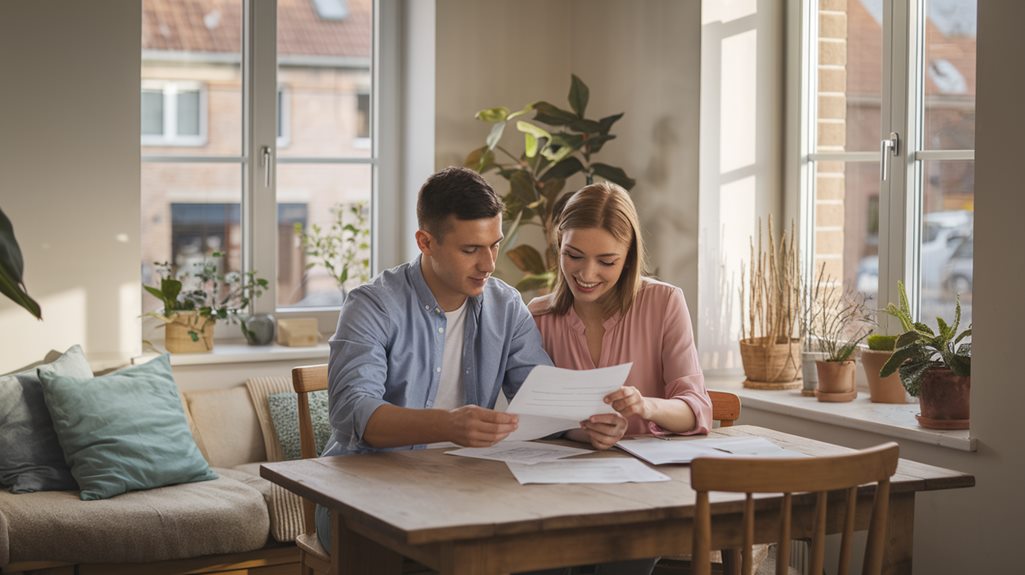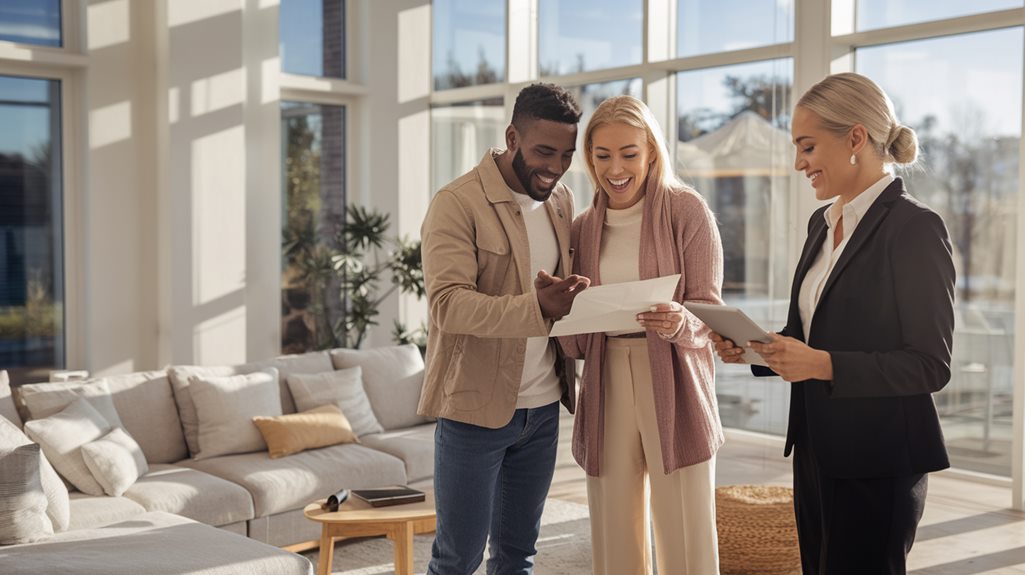Buying your first home can be exciting! Here are some simple steps to help you.
First, check how much money you have. This helps you set a budget.
Next, get a mortgage pre-approval. This shows sellers you are serious about buying.
Then, look at different neighborhoods and find a good real estate agent. They can help you a lot!
When you find a home you like, make a fair offer. It's also important to check the house for any problems by doing a home inspection.
After that, look at loan options to find the best one for you. Make sure you understand how it works.
Finally, when everything is ready, review the paperwork and be ready for extra costs.
Follow these steps, and you'll be on your way to owning your first home!
Ready to start building equity in your own Michigan home? Get your personalized home loan quote today.
Key Takeaways
- Look at your money to see if you can afford a mortgage and handle surprise costs.
- Make a budget by figuring out how much you can pay each month and saving some money for emergencies.
- Get a pre-approval for a mortgage. This helps you look strong to sellers and know how much you can spend.
- Check out different neighborhoods to find good schools, easy transportation, and fun places that match what you like.
- Find a friendly real estate agent. They can help you buy a home and make everything easier.
Michigan residents, unlock the door to your new home. Request your home loan quote from Treeside Financial today.
Assess Your Financial Health

Before you start the fun adventure of buying your first home, it's very important to check how your money is doing. First, make sure you have some extra savings saved up. This will help you if something unexpected happens.
Next, think about any money you owe. It's good to keep your debt low compared to what you earn. This can help your credit score get better.
Look at how steady your income is, too. You want to be sure you can pay your mortgage each month. Keep track of what you spend every day. This will help you find places where you can save more money.
Set clear goals for your money that will help you buy a home one day. Use a budget to keep your finances organized. This will help you plan for the future.
Determine Your Budget
Now that you've looked at your money situation, it's time to make a budget for buying a home. Start by using a mortgage calculator. This tool helps you see how much your monthly payments might be, based on different loan amounts and interest rates. This way, you can have a good idea of what to expect and make smart choices.
Here are some simple steps to help you budget:
- Down payment: Decide how much money you want to save and how long it will take.
- Monthly expenses: Don't forget to include costs like insurance, taxes, and utilities when you plan.
- Emergency fund: Keep some money set aside for unexpected expenses.
Knowing how much you can spend helps you feel like you belong in your new community. By making a clear budget, you're getting closer to your dream home!
Get Pre-Approved for a Mortgage

Getting a pre-approval for a mortgage is an important step when buying a home. It shows sellers that you're serious and ready to buy.
Start by looking at different types of mortgages to find the one that fits your needs. There are fixed-rate and adjustable-rate mortgages. Each has its own good points, so it's helpful to understand them.
Interest rates can change, so if you find a good rate, try to lock it in early. This can save you money!
Getting pre-approved helps you know how much you can spend and makes finding a home easier. You'll feel more confident and part of the group of homebuyers, ready for the next big steps.
Research Locations and Neighborhoods
Finding the right place to live is an important part of buying a home. You want to choose a neighborhood where you'll feel happy and comfortable.
Here are some things to think about as you look for the perfect spot:
- Neighborhood Feel: Take some time to visit the area at different times. This will help you see what it's like in the morning, afternoon, and evening.
- Schools and Parks: Look for good schools and nice parks. These are really important, especially if you have kids.
- Getting Around and Shopping: Make sure there are good ways to get around and places to shop. This can make your daily life much easier.
Take your time to explore and find a community that feels just right for you!
Hire a Real Estate Agent

Hiring a real estate agent can make buying a home much easier. A good agent knows a lot about homes and can help you with all the tricky paperwork and talks with sellers. You'll get to learn about the best homes in your area so you can make smart choices.
When picking an agent, look for someone who's good experience and knows your neighborhood well. They can help you find homes that fit what you want and how much you can spend. This saves you a lot of time and makes things less stressful.
Working with a great agent means you have someone on your side in a busy housing market. You'll feel more confident and part of a community of homebuyers.
Choose the right agent, and your path to owning a home will be much smoother!
Start House Hunting
Start your house hunt by thinking about the neighborhoods that fit your life and what you can spend.
Make a list of what you want in a house, like how many bedrooms you need, if you want a yard, or if you want to be close to stores and parks. This will help you find the right home faster.
After you know what you want, go to open houses to see the homes in person and decide what feels right for you.
Define Desired Neighborhoods
When you start looking for a new home, picking the right neighborhoods is really important. It can make your house hunt much better!
Here are some things to think about to help you feel at home in your new place:
- Fun things to do: Look for neighborhoods that have parks, shops, and places where you can play and relax. Make sure they fit what you like to do!
- Schools and safety: Check out the local schools to see if they're good and look into how safe the area is. This will help you feel safe and happy with your family.
- Getting around and new things: See how easy it's to use buses or trains to get places. Also, find out if there are plans for new parks or stores in the future. This can change how much homes are worth and who lives there.
Learning about local rules and finding fun places nearby can help you decide on the best neighborhood for you.
Make sure it feels just like home!
Set Property Priorities
Now that you have picked out the neighborhoods you like, it's time to think about what you want in a home. This is really important when you start looking for a house. Think about the things that matter to you, like having a big kitchen or a nice backyard where you can play or add more rooms later.
Also, check how far it's to your work and if there are stores and parks nearby that you'd enjoy. Safety is very important too. Make sure the place you choose feels safe for you and your family.
If you have kids or want to have them someday, look into the schools in the area. Good schools are important for your kids and can help when you decide to sell your house later.
Schedule Open House Tours
Finding a new home can be really fun and important. Going to open house tours helps you see different houses and picture yourself living there. Here are some simple steps to help you get ready:
- Get Ready for the Tour: Look up the neighborhoods before you go. Check out parks and schools. Bring a list of things you want to remember.
- Be Polite: When you visit a house, be nice. Ask if you can take pictures or look in closets first.
- Ask Questions: Talk to the agent! Ask them about the house's past, how much it costs to keep running, and if anything has changed recently.
Make an Offer

When you want to buy a house, it's important to know how much it's worth. This helps you make a good offer.
Look at other houses that have sold nearby to find a fair price. This way, you can negotiate better and maybe save some money when you buy your new home.
Understand Market Value
Understanding the real estate market is important if you want to make a good offer on a home. You need to know what houses are worth and what's happening in the market. When there are more homes for sale than buyers, you can look at similar houses to see how much to offer.
Here are some things to think about:
- Market Trends: Look at how house prices change over time.
- Comparative Analysis: Check out similar homes to find a fair price.
- Neighborhood Demographics: Learn about the people living nearby and how the community is growing.
Negotiate Purchase Price
To negotiate the price of a home, you need a plan and some preparation. First, look at similar homes in the area. This will help you know what a fair price is.
When you make your offer, you might want to be flexible with things like when to close or even help with some costs to make your offer better. Remember, the seller might make a counter offer, so stay calm and be ready to change your offer a little if needed.
It's also good to be friendly with the seller. This can help build trust and make the talks easier.
Don't forget to talk to your real estate agent. They can give you helpful advice and support during this process.
Conduct a Home Inspection
Buying a home is a big and exciting step! But before you say yes, it's important to check the house to make sure it's a good choice. Use a home inspection checklist to help you find any problems.
Here are some things to look for:
- Roof Leaks: Look for any water stains on the ceiling or missing roof tiles.
- Foundation Cracks: Check the walls and floors to see if they're strong and not cracked.
- Plumbing Problems: Turn on the faucets and see if they leak or if the water goes down slowly.
Doing these checks helps you feel good about your new home and the neighborhood.
A professional inspector can help find things you might miss, giving you peace of mind. Knowing how the house is helps you feel more at home and part of the community!
Secure Financing

Getting money to buy your first home can be tricky. Start by looking at different loans to see which one works best for you.
Check your credit score because it helps decide how much interest you'll pay. Also, make a budget so you know how much you can spend.
This way, you'll pick a home that feels right for you and won't cause too much stress on your wallet.
Explore Loan Options
Getting the right money to buy a home is very important. It can change how you live in the future.
Let's look at different types of loans to see which one is best for you. Think about:
- Fixed rates vs. adjustable rates: Fixed rates stay the same, so you know what to expect. Adjustable rates can start lower but may change later.
- Government programs: These can help you pay less money upfront and give you better loan terms.
- Lender options: Look at different banks and lenders to find the best interest rates and fees.
Start by checking how much money you can borrow. If your down payment is less than 20%, don't forget about mortgage insurance.
When you understand all of this, you'll feel ready and sure as you move toward buying your home.
Assess Credit Score
Checking your credit score is very important when you're trying to buy your first home. Start by looking at your credit report to see how you're doing. Lenders use your credit score to decide if they can trust you to pay back a loan. This affects how much interest you'll have to pay and the terms of the loan.
Look for any mistakes on your report and think about ways to improve your score. You can do this by paying off some of your debts, paying your bills on time, and not applying for too much new credit. Doing these things will help you look good to lenders and may get you better mortgage deals.
A better credit score makes lenders feel more confident in you. It also helps you feel good as you get ready to become a homeowner.
Determine Budget Limits
Making a budget is very important when you want to buy your first home. You want your home to be a good place to live, not a big worry for your money.
Here are some things to think about:
- Down payment and monthly bills: Think about how much you need to pay now and every month for your mortgage.
- Emergency money and repairs: It's smart to have some extra money saved up for surprises, like fixing things in your home.
- Taxes, insurance, and utility costs: Remember, these are regular payments that can change how much you spend each month.
By keeping these things in mind, you can make sure you're ready to be part of your new neighborhood.
Setting a clear budget helps you feel safe and happy in your new home.
Close the Deal
You're almost at the finish line of buying your new home! It's super important to pay attention to the last steps to make sure everything goes smoothly.
First, take a good look at your final paperwork. Check that everything matches what you agreed on with the seller. This paperwork is like your safety net.
Next, think about the closing costs. These are the extra fees you might need to pay, like for the loan, appraisal, and title insurance. Knowing about these costs ahead of time can help you avoid surprises at the end.
Don't forget to do a final walk-through of the house. This is your chance to make sure any repairs the seller promised are done and that the home looks just like you expected.







